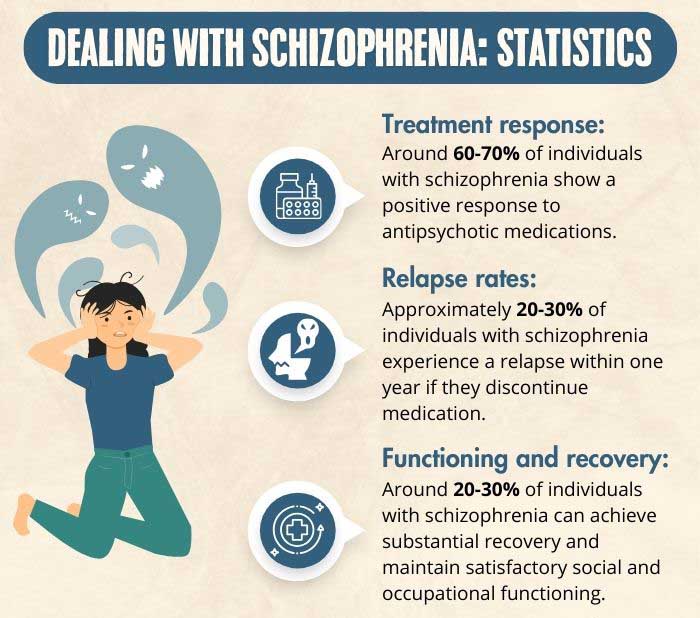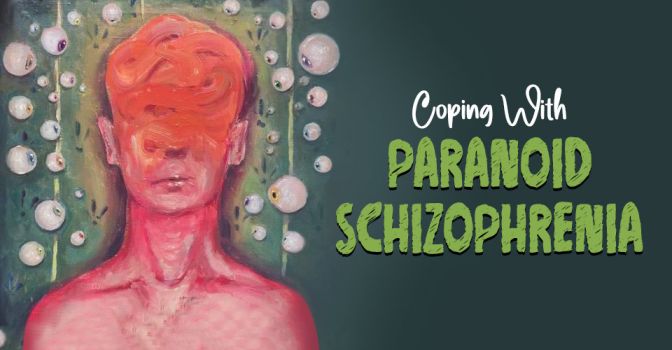Coping with paranoid schizophrenia involves a combination of strategies to manage symptoms, improve overall well-being, and prevent relapses. While it is difficult to prevent the mental health condition, early intervention, adherence to treatment, and ongoing support can significantly improve outcomes.
Chronicity And Prognosis Of Paranoid Schizophrenia
Paranoid schizophrenia is generally considered a chronic condition characterized by periods of relapse and remission. While some affected individuals may experience extended periods of stability and remission, others may have a more recurrent pattern of relapses. This is why the prognosis rates of paranoid schizophrenia 1 Kanahara, N., Yoshida, T., Oda, Y., Yamanaka, H., Moriyama, T., Hayashi, H., Shibuya, T., Nagaushi, Y., Sawa, T., Sekine, Y., Shimizu, E., Asano, M., & Iyo, M. (2013). Onset Pattern and Long-Term Prognosis in Schizophrenia: 10-Year Longitudinal Follow-Up Study. PloS one, 8(6), e67273. https://doi.org/10.1371/journal.pone.0067273 vary so much.
These unpredictable relapses in paranoid schizophrenia can vary in severity and duration. Factors that can contribute to relapse include medication non-adherence, substance abuse, high levels of stress, inadequate support, and disruptions in treatment or care.
Therefore, dealing with paranoid schizophrenia’s chronic and relapsing nature requires a comprehensive approach combining counseling, pharmacotherapy, and self-care.
Read More About Paranoid Schizophrenia Here

Self-Help Strategies For Coping With Paranoid Schizophrenia
The following self-help strategies 2 Holubova, M., Prasko, J., Hruby, R., Kamaradova, D., Ociskova, M., Latalova, K., & Grambal, A. (2015). Coping strategies and quality of life in schizophrenia: cross-sectional study. Neuropsychiatric disease and treatment, 11, 3041–3048. https://doi.org/10.2147/NDT.S96559 can be utilized by affected individuals to cope with paranoid schizophrenia:
1. Educate yourself:
Learn about paranoid schizophrenia to gain a better understanding of the condition, its symptoms, and available treatment options. This knowledge can help you make informed decisions when it comes to managing paranoid schizophrenia and actively participate in your own care.
2. Develop a support network:
Surround yourself with a supportive network of family, friends, and support groups. Seek out individuals who can provide understanding, empathy, and encouragement during difficult times.
3. Practice stress management techniques:
Explore stress reduction techniques for managing paranoid schizophrenia, such as deep breathing exercises, meditation, yoga, or mindfulness. These practices can help calm the mind and reduce anxiety.
Read More About Stress Management Here
4. Establish a routine:
Create a structured daily routine that includes activities such as self-care, exercise, hobbies, and social interactions. Having a predictable schedule can provide stability and a sense of control.
5. Maintain a healthy lifestyle:
Focus on maintaining a balanced diet, regular exercise, and sufficient sleep. Engaging in physical activity can help reduce stress and improve overall well-being.
6. Monitor your symptoms:
Pay attention to any changes in your symptoms and identify triggers that may exacerbate them. Keeping a symptom journal can help you track patterns and share valuable information with your healthcare team.
7. Practice self-care:
Engage in activities that promote self-care and relaxation, such as taking baths, listening to music, reading, or engaging in hobbies that bring you joy and calmness.
Read More About Self Care And Wellness Here
8. Set realistic goals:
To cope with paranoid schizophrenia, establish small, achievable “recovery goals” for yourself. Celebrate your accomplishments and be kind to yourself when facing setbacks or challenges.
Read More About Goals Here
9. Communicate openly with healthcare providers:
Maintain regular communication with your healthcare team, including your psychiatrist, therapist, or counselor. Be open about your experiences, concerns, and any changes in your symptoms.
10. Avoid substance abuse:
Substance abuse can worsen symptoms and interfere with treatment. Avoid or minimize the use of alcohol, drugs, and other substances.
Reducing The Risk Of Paranoid Schizophrenia
While it is not possible to completely prevent paranoid schizophrenia, certain measures can help minimize the risk. Reducing the risk of the disorder 3 Klosterkötter, J., Schultze-Lutter, F., Bechdolf, A., & Ruhrmann, S. (2011). Prediction and prevention of schizophrenia: what has been achieved and where to go next?. World psychiatry : official journal of the World Psychiatric Association (WPA), 10(3), 165–174. https://doi.org/10.1002/j.2051-5545.2011.tb00044.x involves a combination of factors that target both genetic and environmental influences.
These include avoiding or minimizing the use of psychoactive substances (such as cannabis) which has been linked to an increased risk of developing paranoid schizophrenia.
Additionally, ensuring a healthy and supportive environment during pregnancy and early childhood, such as providing proper nutrition, reducing stress, and promoting a stable and nurturing home environment, may help lower the risk.
Early detection and intervention for individuals showing prodromal symptoms or at high risk can also play a crucial role in minimizing the impact of the illness.
Takeaway
Dealing with paranoid schizophrenia requires a comprehensive approach that includes building a support network, adopting a healthy lifestyle, adhering to medication and treatment plans, setting realistic goals, and engaging in meaningful activities.
It should, however, be noted that these coping strategies are not a substitute for medical care. These techniques can only prove to be effective when used along with medications and therapy under the guidance of a licensed mental health professional.
Schizophrenia recovery and treatment comprise a unique journey for each individual, and progress may vary. However, with patience, persistence, and a holistic approach that addresses physical, psychological, and social well-being, by which individuals can improve their quality of life and achieve better healing outcomes.
At A Glance
- Coping with paranoid schizophrenia involves a combination of strategies to manage symptoms, improve overall well-being, and prevent relapses.
- Paranoid schizophrenia is a chronic condition characterized by periods of relapse and remission, and the prognosis can vary among individuals.
- Factors such as medication non-adherence, substance abuse, stress, and inadequate support can contribute to relapses in paranoid schizophrenia.
- Self-help strategies for coping with paranoid schizophrenia include education, building a support network, stress management, establishing a routine, maintaining a healthy lifestyle, monitoring symptoms, practicing self-care, setting realistic goals, communicating with healthcare providers, and avoiding substance abuse.
- These strategies should be used in conjunction with medical care, and individual progress may vary.
Frequently Asked Questions (FAQs)
1. What should you not say to a paranoid schizophrenic?
Avoid making dismissive or invalidating statements, minimizing their experiences, or challenging the reality of their beliefs or hallucinations.
2. Do paranoid schizophrenics know they are ill?
Not all individuals with paranoid schizophrenia may have insight into their illness. Some may have limited awareness or be completely unaware of their condition due to the nature of their symptoms i.e. also known as a condition called anosognosia.
3. How can you effectively communicate with a paranoid schizophrenic?
When communicating with a paranoid schizophrenic, it is important to maintain a calm and non-confrontational approach, actively listen, validate their feelings, avoid arguing or contradicting their delusions, and use clear and simple language to convey your message.











